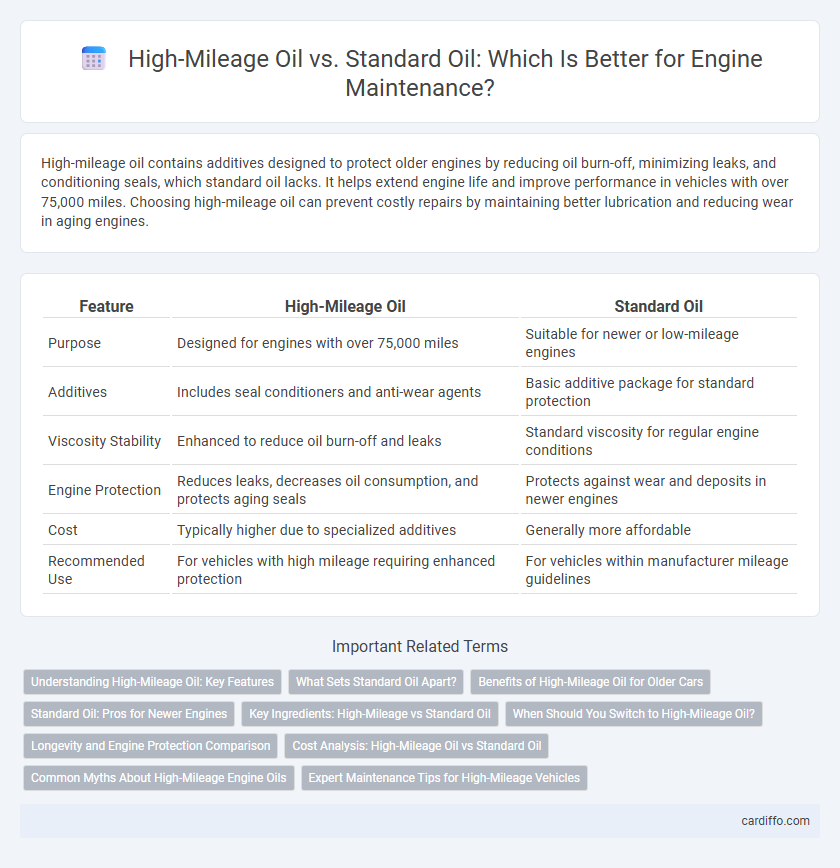High-mileage oil contains additives designed to protect older engines by reducing oil burn-off, minimizing leaks, and conditioning seals, which standard oil lacks. It helps extend engine life and improve performance in vehicles with over 75,000 miles. Choosing high-mileage oil can prevent costly repairs by maintaining better lubrication and reducing wear in aging engines.
Table of Comparison
| Feature | High-Mileage Oil | Standard Oil |
|---|---|---|
| Purpose | Designed for engines with over 75,000 miles | Suitable for newer or low-mileage engines |
| Additives | Includes seal conditioners and anti-wear agents | Basic additive package for standard protection |
| Viscosity Stability | Enhanced to reduce oil burn-off and leaks | Standard viscosity for regular engine conditions |
| Engine Protection | Reduces leaks, decreases oil consumption, and protects aging seals | Protects against wear and deposits in newer engines |
| Cost | Typically higher due to specialized additives | Generally more affordable |
| Recommended Use | For vehicles with high mileage requiring enhanced protection | For vehicles within manufacturer mileage guidelines |
Understanding High-Mileage Oil: Key Features
High-mileage oil contains specialized additives such as seal conditioners, anti-wear agents, and detergents designed to protect engines with over 75,000 miles by reducing leaks, minimizing oil consumption, and preventing sludge buildup. Its formulation targets the unique challenges of aging engines, including worn seals and increased friction, which standard oil may not adequately address. Using high-mileage oil can extend engine life, improve performance, and maintain fuel efficiency in older vehicles.
What Sets Standard Oil Apart?
Standard oil is formulated with a balanced blend of base oils and additives designed to provide efficient lubrication for engines with typical mileage, ensuring optimal performance under normal driving conditions. It contains detergents and dispersants that keep the engine clean by preventing sludge and deposit buildup. Unlike high-mileage oil, standard oil lacks specialized seal conditioners and anti-wear additives tailored to address the unique challenges of aging engines.
Benefits of High-Mileage Oil for Older Cars
High-mileage oil is specifically formulated with seal conditioners and detergents that help reduce leaks and prevent sludge buildup in engines with over 75,000 miles. Its advanced additives improve engine performance and protect against wear, extending the lifespan of older cars. Using high-mileage oil can enhance fuel efficiency and reduce oil consumption compared to standard oil.
Standard Oil: Pros for Newer Engines
Standard oil offers optimal lubrication for newer engines, ensuring efficient performance by maintaining proper viscosity at all operating temperatures. It contains essential additives that protect engine components from wear, corrosion, and deposits, extending engine longevity. Using standard oil in newer engines also supports manufacturer warranties and helps achieve recommended fuel economy standards.
Key Ingredients: High-Mileage vs Standard Oil
High-mileage oil contains seal conditioners, anti-wear additives, and detergents designed to protect older engines with over 75,000 miles by reducing leaks and minimizing wear. Standard oil primarily focuses on basic lubrication and protection for engines with normal mileage, lacking enhanced additives for aging engine components. These key ingredient differences improve longevity and performance in high-mileage vehicles compared to standard formulations.
When Should You Switch to High-Mileage Oil?
Switch to high-mileage oil when your vehicle surpasses 75,000 miles, as its enhanced additives help reduce engine wear, minimize oil burn-off, and prevent leaks common in older engines. High-mileage oil contains seal conditioners and detergents tailored to extend engine life and improve performance in aging vehicles. Regularly consulting your manufacturer's recommendations ensures timely oil changes and optimal engine health.
Longevity and Engine Protection Comparison
High-mileage oil contains additives that swell engine seals and reduce oil burn-off, extending engine life in vehicles with over 75,000 miles. Standard oil lacks these specific formulations, which may result in faster wear and decreased protection for older engines. Choosing high-mileage oil enhances longevity and maintains optimal engine performance by preventing leaks and minimizing sludge buildup.
Cost Analysis: High-Mileage Oil vs Standard Oil
High-mileage oil often costs 15-30% more than standard oil, but its specialized additives can reduce engine wear and extend oil change intervals, potentially lowering long-term maintenance expenses. Standard oil is less expensive upfront but may require more frequent changes and does not offer the same level of protection for older engines, which can lead to increased repair costs over time. Evaluating cost-effectiveness involves balancing the initial price difference against potential savings in engine longevity and reduced service frequency.
Common Myths About High-Mileage Engine Oils
High-mileage engine oils are often believed to significantly extend engine life by sealing leaks and reducing oil consumption, but these benefits primarily depend on proper maintenance rather than the oil alone. Many myths suggest high-mileage oils dramatically improve performance in all vehicles, yet they are specifically formulated for engines with over 75,000 miles to address wear-related issues like sludge buildup and seal conditioning. Standard oil provides adequate lubrication for newer engines, while high-mileage oils contain additives such as seal conditioners and anti-wear agents designed to protect older engines and potentially prevent costly repairs.
Expert Maintenance Tips for High-Mileage Vehicles
High-mileage oil contains special additives and seal conditioners designed to protect engine components and reduce leaks in vehicles with over 75,000 miles, enhancing longevity and performance. Experts recommend using high-mileage oil for older engines to maintain optimal viscosity, reduce oil burn-off, and prevent sludge buildup. Regular oil changes with this formula, combined with routine engine inspections, are essential for prolonging the life of high-mileage vehicles.
High-Mileage Oil vs Standard Oil Infographic

 cardiffo.com
cardiffo.com